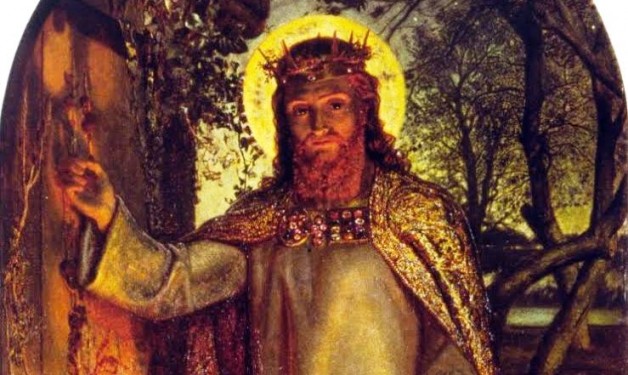I sometimes imagine how a person—any person—might react when they hear that Catholics are beginning a Year of Faith. Perhaps they would ask, “What makes that different than any other year?” Or even, “What about faith? They’re just going to celebrate . . . all of it?”
When we conceive of faith in general terms, as a sort of “something” that helps us trust God, we’re left wondering what it really is at all. From this perspective, the Church’s Year of Faith seems akin to a writers’ Year of Ink (for making it all possible) or a sea creatures’ Year of Salt (since freshwater won’t do) or a government ruling that, this year, each day is everybody’s birthday.
We need something particular to believe in, to be seized by. Otherwise, these questions don’t matter to us and we go on living by our own resources. Faith must be specific if it’s really faith.
In today’s Gospel (Lk 11:5–13), Jesus tells a parable of two friends. One comes to the door of the other’s house at midnight and asks for three loaves of bread. The friend within replies, “The door has already been locked and my children and I are already in bed. I cannot get up to give you anything.” Commenting on this, Jesus says that, eventually, the friend within will open the door to the friend without because of his “persistence.” The Greek word here is anaideia, implying insistence to point of being shameless or rude. In fact, Anaideia was the name of the Greek Goddess of Ruthlessness. But such is the way of friends: one barges down the other’s door, and after a few days they’ve forgotten the incident altogether.
The point is that, in this parable, faith is not general or vague. It’s precisely a matter between friends. The persistent friend needs help because he has just received a guest, and, as he says, “I have nothing to offer him.” It is his inadequacy that moves him to beg for bread—to go and bother his friend. Incidentally, there are echoes here, not only of the Eucharist, but also of the petition for “daily bread” in the OurFather, which, in Luke’s Gospel, immediately precedes this parable.
Jesus rounds off his instruction with the famous words,
Ask and you will receive; seek and you will find; knock and the door will be opened to you. What father among you, if his son asks for a fish, will instead of a fish give him a serpent; or if he asks for an egg, will give him a scorpion? . . . how much more will the heavenly Father give the Holy Spirit to those who ask him.
The Holy Father announced this Year of Faith in the apostolic letter Porta fidei—“The Door of Faith.” How fitting, then, that another prominent feature in today’s Gospel is the door. Indeed, we find doors, of one kind or another, throughout the New Testament. After the Sabbath rest, for example, Jesus appears to his disciples “on the evening of the first day of the week, when the doors were locked” (Jn 20:19). The stone that sealed his dead body in the tomb—more than a door, we might say—was rolled away, and by evening he walked through closed doors to turn his friends’ fear again into faith. We might also think of the Parable of the Good Shepherd, in which Jesus identifies himself as “the door for the sheep” and says, “If any one enters by me, he will be saved, and will go in and out and find pasture” (Jn 10:7, 9).
We also shouldn’t forget the passage from Revelation—Jesus’ last words to the seven churches: “Behold, I stand at the door and knock. If anyone hears my voice and opens the door, I will enter his house and dine with him, and he with me” (Rv 3:20). There is a well-known Victorian painting of this scene by William Holman Hunt. Christ waits outside with a lantern, dressed as a bridegroom, but the door has no handle. It can only be opened from within, for our God has always been a gentleman. He will plead with us, but he will not force himself upon us.
All this talk of doors also reminds me of a piece of my childhood. When my brothers and I were boys, it was my father’s habit to arrive home from work at six o’clock each evening. He would knock with his own distinctive rhythm, and the moment the three of us heard it, we would rush headlong down the hall, throw open the door, and immediately attack him, latching onto his legs until he fought his way to the kitchen and we were tired out. I also remember one New Year’s, when he dented the same door by misfiring a champagne cork, but that’s beside the point. The take-away thought is that, for me, the door meant dad.
There is nothing general or vague about what we celebrate this year. It’s the gift given to each of us at Baptism, which flowers over the course of a lifetime and enables us to “respond to God, who reveals himself and gives himself to man” (CCC 26). Our task is small: only to approach Jesus each day as one of “those who ask.” God himself is anaideia, shameless, in his love for us, and as he knocks he assures us, “Do not be afraid any longer, little flock, for your Father is pleased to give you the kingdom” (Lk 12:32).
✠
Image: William Holman Hunt, The Light of the World







